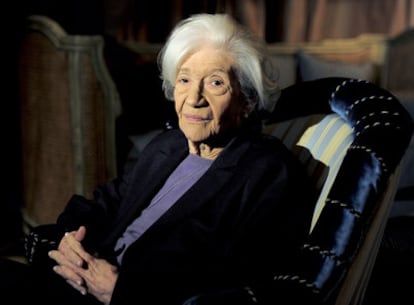Ana María Matute wins Cervantes Prize
Octogenarian becomes only the third woman to pick up Spain's most prestigious literary award
Ana María Matute, 85, has won the Cervantes Prize, the most prestigious literary award in the Spanish language. Culture Minister Ángeles González-Sinde announced this year's winner, who has now earned every major prize in the field, from the National Literature Award in 2007 to the Nadal in 1959 and the Planeta in 1954.
"I was born when my parents no longer loved each other" is the opening line in Paraíso inhabitado (or, Uninhabited paradise), her last novel and perhaps the most autobiographical of all her work. Like Olvidado Rey Gudú, Aranmanoth, La torre vigía, Los soldados lloran de noche, La Trampa and so many other books, it reveals her extraordinary talent for creating moving stories.
This latest prize recognizes Matute's entire writing career, spanning from 1947 to 1998, including 12 novels and several collections of short stories now available in one volume, La puerta de la luna (or, The door of the moon).
In a recent interview with EL PAÍS, Matute had said that "if they give me the Cervantes, I will jump for joy - spiritually." Matute, a strong woman with a fragile health, uses a walking stick. Although most biographies list her as being 84, she confirmed that she was born in 1925 and is one year older.
Matute is only the third woman to receive the Cervantes since its inception in 1976 - the other two are María Zambrano (1988) and the Cuban poet Dulce María Loynaz (1992). An unwritten rule says that after a Spaniard has won the prize, it goes to a Latin American writer the following year. Last year's winner was Mexico's José Emilio Pacheco, which meant that a Spanish author was expected to get the accolade this year. Matute is perhaps the only writer in Spain who had openly admitted that she would like to win it.
Matute was 17 when she wrote her first novel, Pequeño teatro, although it was two more years before she took it to the publishing house Destino to see if anyone would print it. She recalls how she had to overcome her innate shyness and screw up her courage to walk in.
"I've been writing since I was five. I thought Destino was the best publisher. I went three or four times, but the director, Ignacio Agustí, was always busy. A young man who worked there told me: "Come on such a days and such a time and I'll get you in." I was shaking like a leaf, but Agustí was very kind. He told me to type it up and that they would read it. [...] I took it back and two weeks later I ran into Ignacio Agustí on the street. He called me Miss Matute and told me they were amazed."

Tu suscripción se está usando en otro dispositivo
¿Quieres añadir otro usuario a tu suscripción?
Si continúas leyendo en este dispositivo, no se podrá leer en el otro.
FlechaTu suscripción se está usando en otro dispositivo y solo puedes acceder a EL PAÍS desde un dispositivo a la vez.
Si quieres compartir tu cuenta, cambia tu suscripción a la modalidad Premium, así podrás añadir otro usuario. Cada uno accederá con su propia cuenta de email, lo que os permitirá personalizar vuestra experiencia en EL PAÍS.
¿Tienes una suscripción de empresa? Accede aquí para contratar más cuentas.
En el caso de no saber quién está usando tu cuenta, te recomendamos cambiar tu contraseña aquí.
Si decides continuar compartiendo tu cuenta, este mensaje se mostrará en tu dispositivo y en el de la otra persona que está usando tu cuenta de forma indefinida, afectando a tu experiencia de lectura. Puedes consultar aquí los términos y condiciones de la suscripción digital.








































